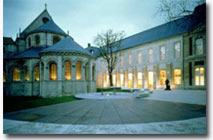26th IFIP WG 6.1 International Conference on
Formal Methods for Networked and Distributed Systems
Special focus on verified middleware and distributed services
Call for paper
The 26th FORTE conference will take place in Paris in the buildings of the CNAM (Conservatoire National des Arts et Métiers http://www.cnam.fr) localized in the center of Paris. FORTE is dedicated to formal description techniques and their application to
 distributed systems and cooperating applications.
The focus of FORTE'06 is on the construction of middleware and
services using formalized and verified approaches. In addition to the
classical protocol specification, verification and testing problems,
Forte'06 will address the issues of composition of protocol functions
and of algorithms for distributed systems. Contributions on the
issues of composing and orchestrating services are also encouraged.
distributed systems and cooperating applications.
The focus of FORTE'06 is on the construction of middleware and
services using formalized and verified approaches. In addition to the
classical protocol specification, verification and testing problems,
Forte'06 will address the issues of composition of protocol functions
and of algorithms for distributed systems. Contributions on the
issues of composing and orchestrating services are also encouraged.
Topics of interest
The aim of FORTE 2006 is to provide a forum for researchers and users to review, discuss, and learn about new approaches, concepts and experiences in the application of formal methods for the specification and the verification of distributed systems and applications. Formal description techniques include (but are not limited to) SDL, UML notations, Domain Specific Languages (DSLs), LOTOS, MSC, Promela, etc. Contributions on Formal paradigms based on finite state machines process algebras, Petri nets, logics or timed automata, etc are also encouraged. The application domains include networking, telecommunication services, internet, embedded systems, real time systems, transport systems, networked games, web based systems and services, etc. Topics of interest include, but are not restricted to- Use of formal methods: Formally based design of communication protocols, formal verification, composition of protocols, definition and verification of design patterns, integration of protocol functions into middleware, distributed systems, Automatically derived implementations, Transformation based development, Composition, interaction and orchestration of services, Test of distributed systems and communication protocols including interoperability tests, performance tests, robustness tests, and test generation procedures, Tool support.
- Theoretical aspects of formal methods: New approaches and theories, Extensions of formal description techniques, Semantic foundations, Real-time and probability aspects, semantics of domain specific languages, semantical foundations for UML notations.
- Practical experience with formal methods: Reports and case studies of the use of formal methods and FDTs in the development and the validation of distributed systems.
Submissions
Authors are invited to submit either regular (16 pages) or short papers (5 pages). All papers must be in English, clear, complete and must be original contributions. Short papers are either devoted to describing work in progress or to the presentation and evaluation of tools. Practical experience papers can be either long or short. All submissions will be evaluated by the program committee for inclusion in the proceedings, which will be published Springer-Verlag in the Lecture Notes in Computer Sciences series. Authors are required to submit a paper title and a short abstract not exceeding 200 words at the conference web site no later than April 18th, 2006 (extended dealine).Important dates
-
18 April 2006 (recommended) Short abstract submission deadline
-
25 April 2006 (extended) Paper submission deadline
-
5 June 2006 Notification to authors
-
25 June 2006 Camera-ready version
-
September 26th - 29th, 2006 Conference
General chair
Véronique Viguié Donzeau-Gouge, CEDRIC-CNAMProgram chair
Elie Najm, ENST, FranceJean-François Pradat-Peyre, CEDRIC-CNAM
Organization committee
Christine Choppy, LIPN Univ. Paris-NordJoyce El Haddad, Lamsade Univ. Paris Dauphine
Sami Evangelista, CEDRIC-CNAM
Irfan Hamid, Infres-ENST, France
Christophe Pajault, CEDRIC-CNAM
Emmanuel Paviot-Adet, LIP6 Univ. Pierre et Marie Curie
Pierre Rousseau, CEDRIC-CNAM